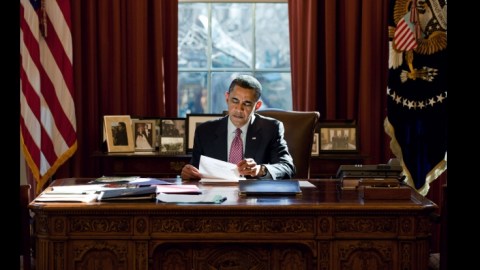Obama’s Innovation Revolution

Last week, President Obama called upon the US Chamber of Commerce – America’s largest business federation – to do more for the nation. And right they should. Without business generating new ideas, the U.S. will lose its competitive edge to China. War kick-started the American economy in the 1940s, when industries answered the government’s call to produce more and hire more. The result was not only a boon to the war effort, but higher employment and a booming middle class.
The battle is now figurative but keeping America inventive and productive has never been more important. China is predicted to overtake the US as the world’s number one economy by 2020. And with its commitment to Indigenous Innovation – the promotion of domestic invention matched with unfavorable terms on foreign companies – the shift is already upon us.
Obama recognizes the government’s role in all this – the need for infrastructure upgrades, education reform and an overhaul of the tax code system. And these sectors remain untouched despite massive proposed deficit cuts. But the private sector must in turn answer the call and open its purse strings to unlock needed innovation. Investment from the three million businesses represented in the Chamber poses an enormous opportunity to move America forward.
There is no right time for a business to open the floodgates to investment. Chamber members are looking for an economic turnaround before pressing go, but signs already point to an increase in demand. Sitting on two trillion dollars of capital won’t move the economy along.
The US government is on the right track – literally and figuratively. An American-produced high-speed network would not only mean jobs, but signal less reliance on technology from oversees. And, even now, new EPA regulations may lead to millions more jobs from the construction and rehabbing of plants in the power sector. While Congress, in its fiscal restraint, may be tempted to cut this work it would be harmful in the long term. I’ve seen this in the UK. In the 1980s its prototype Advanced Passenger Train pioneered the tilting tracks seen on many modern networks. It was aborted – another heroic British failure – the biggest concern was spilt tea. Mocked by the media at the time, the UK now buys its trains from Japan or Germany. Britain’s stubborn pride is further dented by the French, who don’t just build and run British nuclear power stations, but now own them too. All thanks to government dithering and shortsightedness.
Yet even if America’s leaders invest in 21st century projects, it will be hampered by a workforce that doesn’t possess the skills or training needed. Over the next eight years, American employers will need over twenty million new workers with postsecondary degrees. The US is on track to fall short by three million; it needs real, long-term education reform to prepare for tomorrow’s jobs. With a rising number of students failing advanced placement tests, clearly many remain unprepared for higher learning, not to mention real life skills application. A commitment to hire and train 100,000 new math and science teachers and a focus on hands-on and vocational learning will lead to better students and more highly skilled workers.
With government-supported infrastructure and education overhauls, businesses should be in a better position to spend. But the complex corporate tax code is muddy and expensive, and keeps many from investing in much needed research and development. Businesses are already benefiting from an extension to the federal R&D tax credit. In fact, DuPont partly credits its fourth quarter profits to the favorable tax rate. These kind of large and permanent R&D tax credits are needed. They are especially valuable to small business and high tech companies – those most important to remaining competitive. I’ve advocated for similar tax credits in the UK. But the government here, perhaps seduced by the “digital economy,” has so far failed to focus the R&D tax allowance on companies creating intellectual property to create new, better technology to export around the world.
With China set to overtake the U.S. this year in the number of patent filings, the U.S. is ripe for reinvention. The President’s call to action shouldn’t be met with dragged feet and clenched fists. It’s an opportunity to reignite American industry. Investing in new ideas and the workforce to see them realized isn’t lip service, it’s essential.





